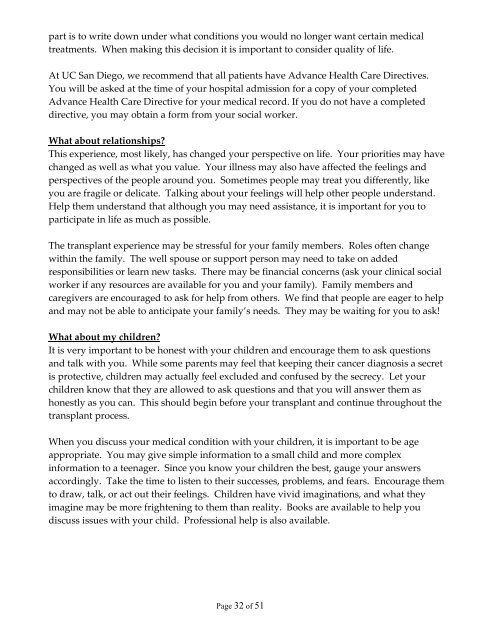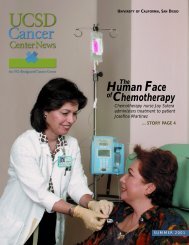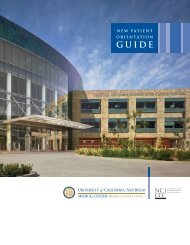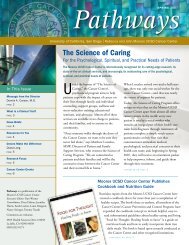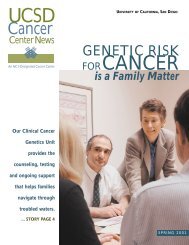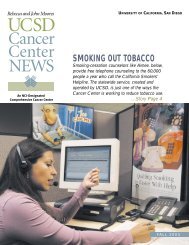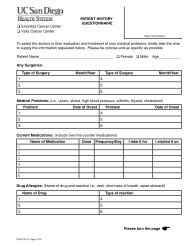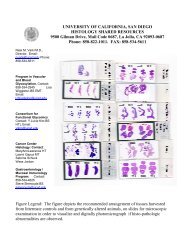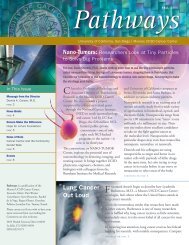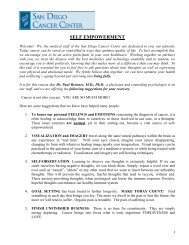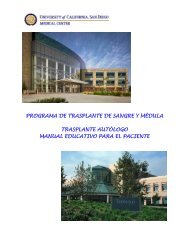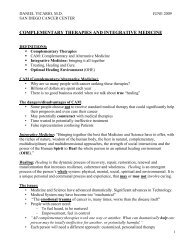Autologous Transplant Patient Education Manual - Moores Cancer ...
Autologous Transplant Patient Education Manual - Moores Cancer ...
Autologous Transplant Patient Education Manual - Moores Cancer ...
You also want an ePaper? Increase the reach of your titles
YUMPU automatically turns print PDFs into web optimized ePapers that Google loves.
part is to write down under what conditions you would no longer want certain medical<br />
treatments. When making this decision it is important to consider quality of life.<br />
At UC San Diego, we recommend that all patients have Advance Health Care Directives.<br />
You will be asked at the time of your hospital admission for a copy of your completed<br />
Advance Health Care Directive for your medical record. If you do not have a completed<br />
directive, you may obtain a form from your social worker.<br />
What about relationships<br />
This experience, most likely, has changed your perspective on life. Your priorities may have<br />
changed as well as what you value. Your illness may also have affected the feelings and<br />
perspectives of the people around you. Sometimes people may treat you differently, like<br />
you are fragile or delicate. Talking about your feelings will help other people understand.<br />
Help them understand that although you may need assistance, it is important for you to<br />
participate in life as much as possible.<br />
The transplant experience may be stressful for your family members. Roles often change<br />
within the family. The well spouse or support person may need to take on added<br />
responsibilities or learn new tasks. There may be financial concerns (ask your clinical social<br />
worker if any resources are available for you and your family). Family members and<br />
caregivers are encouraged to ask for help from others. We find that people are eager to help<br />
and may not be able to anticipate your family’s needs. They may be waiting for you to ask!<br />
What about my children<br />
It is very important to be honest with your children and encourage them to ask questions<br />
and talk with you. While some parents may feel that keeping their cancer diagnosis a secret<br />
is protective, children may actually feel excluded and confused by the secrecy. Let your<br />
children know that they are allowed to ask questions and that you will answer them as<br />
honestly as you can. This should begin before your transplant and continue throughout the<br />
transplant process.<br />
When you discuss your medical condition with your children, it is important to be age<br />
appropriate. You may give simple information to a small child and more complex<br />
information to a teenager. Since you know your children the best, gauge your answers<br />
accordingly. Take the time to listen to their successes, problems, and fears. Encourage them<br />
to draw, talk, or act out their feelings. Children have vivid imaginations, and what they<br />
imagine may be more frightening to them than reality. Books are available to help you<br />
discuss issues with your child. Professional help is also available.<br />
Page 32 of 51


